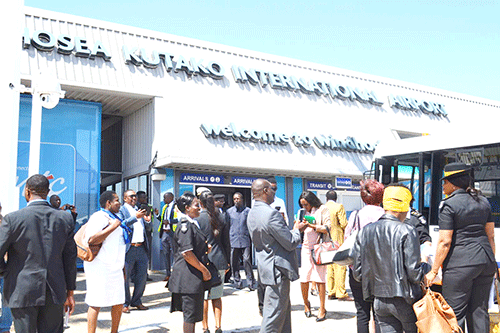The Namibia Airports Company (NAC) is reflecting on and celebrating the recent outcome of the country’s Universal Safety Oversight Audit Programme – Continuous Monitoring Approach (USOAP-CMA). This programme was an on-site audit conducted by the International Civil Aviation Organisation (ICAO) from 6 to 18 March 2024.
ICAO is an international member-based organisation that develops policies and standards, undertakes compliance audits, performs studies and analyses, provides assistance and builds aviation capacity.
It achieves these tasks and many other activities through the cooperation of its member states and various industry stakeholders.
The international audit was undertaken to evaluate the effectiveness of Namibia’s safety oversight systems in compliance with the ICAO Standards and Recommended Practices (SARPs).
At the closing meeting of the audit held on 18 March 2023, ICAO’s lead auditor issued the preliminary results for Namibia with a score of 72.31%.
“In 2016, Namibia’s overall score was 57.39%. These results were reached after an assessment of Namibia’s effective implementation. When a country registers Significant Safety Concerns (SSC) in such an audit, it means that there is a serious breach of safety standards, which can ultimately lead to several airlines shunning the airspace of that country,” read an NAC statement issued yesterday.
The NAC stated the results indicated an overall improvement in the safety performance of the State of Namibia, ranking the State above the regional/Eastern and Southern Africa (ESAF) region average of 60% and the global average of 69.3%.
The final report with details is expected to be issued by ICAO after six months. The standard industry practice is that the final results do not usually deviate much from the preliminary results.
“As the custodian of the country’s main airports, NAC was under the spotlight in terms of how we have prepared for this audit – and we, at all times, demonstrated confidence in our systems, which was key to the country achieving the current score,” the NAC stated.
The statement added that this latest score is a vote of confidence in Namibia’s aviation safety systems.
“It is also worth mentioning that Hosea Kutako International Airport is certified, and I reiterate the collaboration between all stakeholders to maintain the momentum that was exhibited during the on-site audit with the intent to retain the consistency in the oversight responsibilities to ensure a robust state oversight system in the country,” stated NAC CEO Bisey /Uirab.
“NAC will continue to source resources for the development and maintenance of the airport facilities to ensure that we remain on the trajectory to develop world-class airports for Namibia’s prosperity,” the airports company added.
Meanwhile, towards the end of March 2024, global aviation leaders underscored ICAO’s key role in leading the cooperation needed to deliver a sustainable future, centred around innovation and resilience.
This was after the aviation sector showed remarkable resilience in the face of the recent pandemic, with ICAO now forecasting that 2024 air traffic volumes are expected to exceed pre-pandemic levels.
ICAO stated that this growth underscores the urgency of addressing aviation sustainability, with a significant focus on ramping up the production of Sustainable Aviation Fuels (SAF).
“Our commitment to a net zero future is unwavering, and the cooperation and coordination of industry leaders with and through ICAO is essential to delivering it,” said ICAO council president Salvatore Sciacchitano.
“We recognise that achieving this global objective will require unprecedented efforts from all actors across aviation and in the supply chain.”


